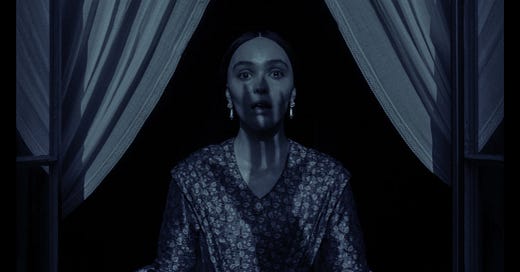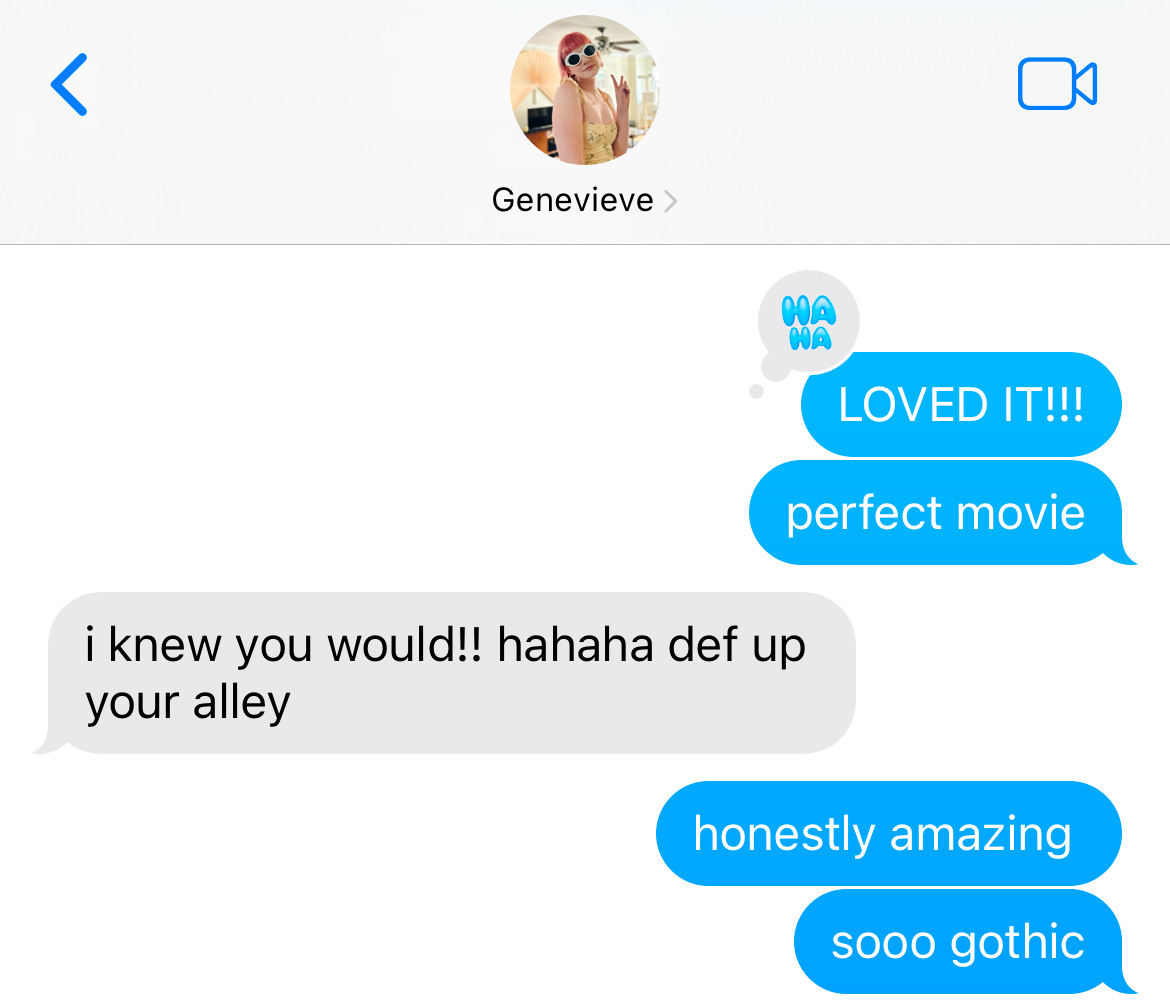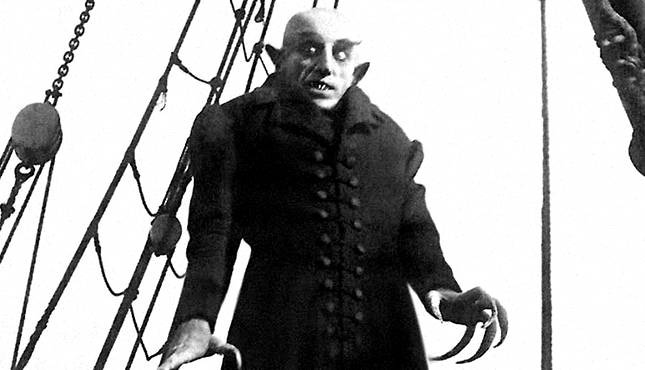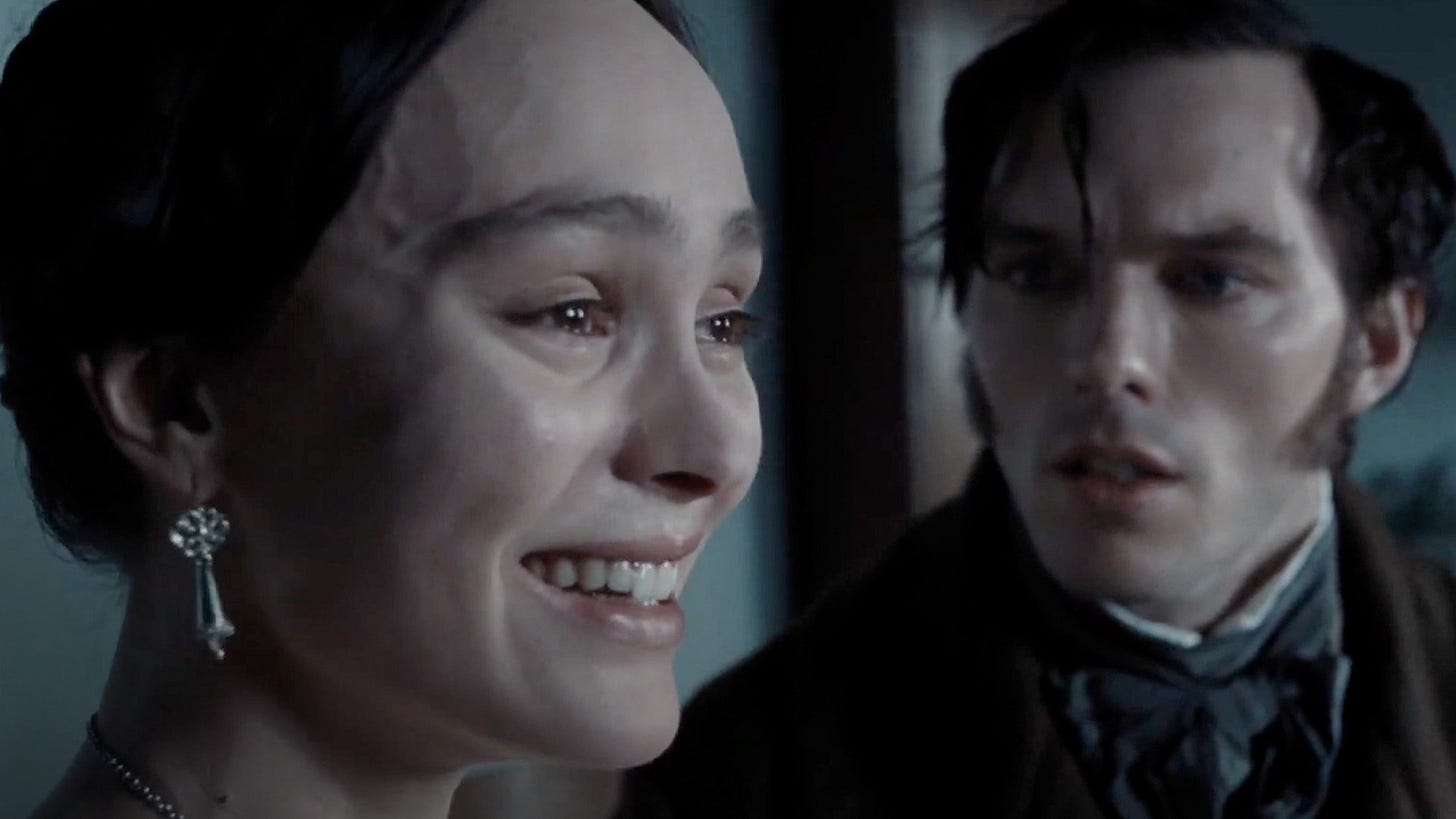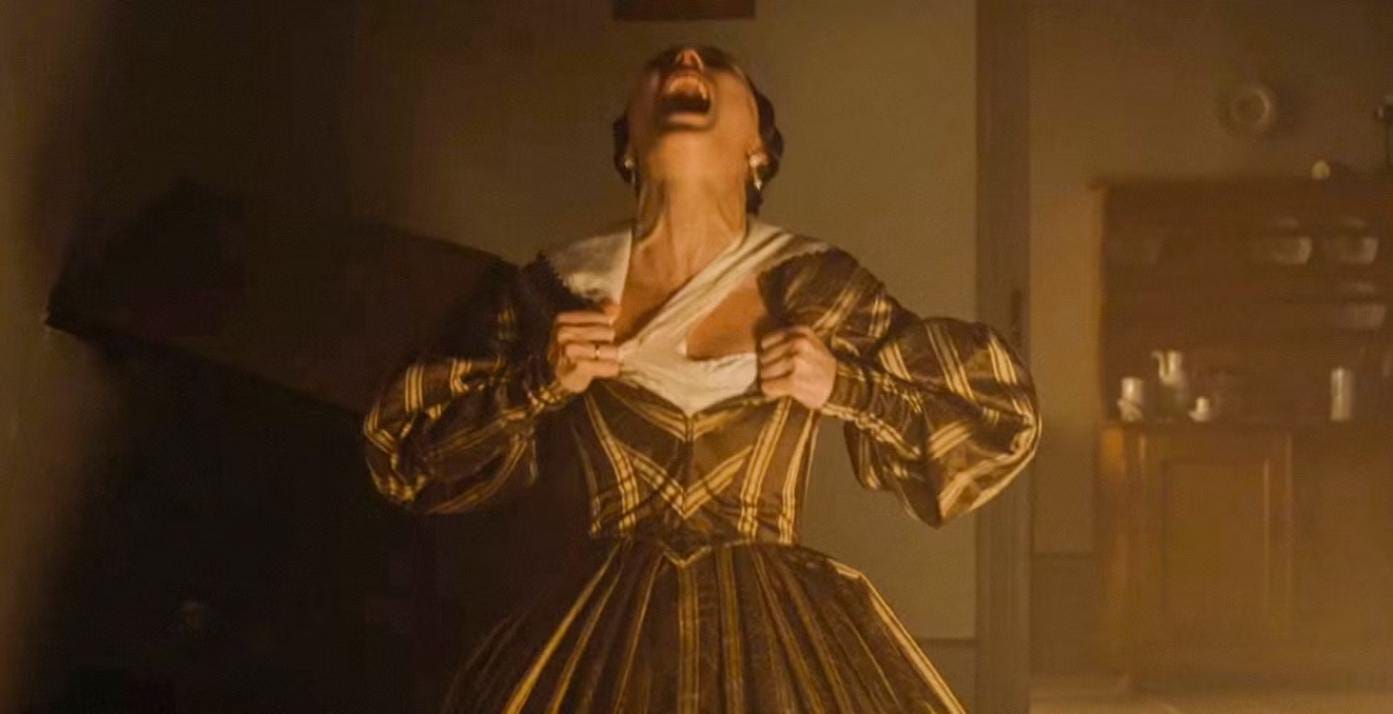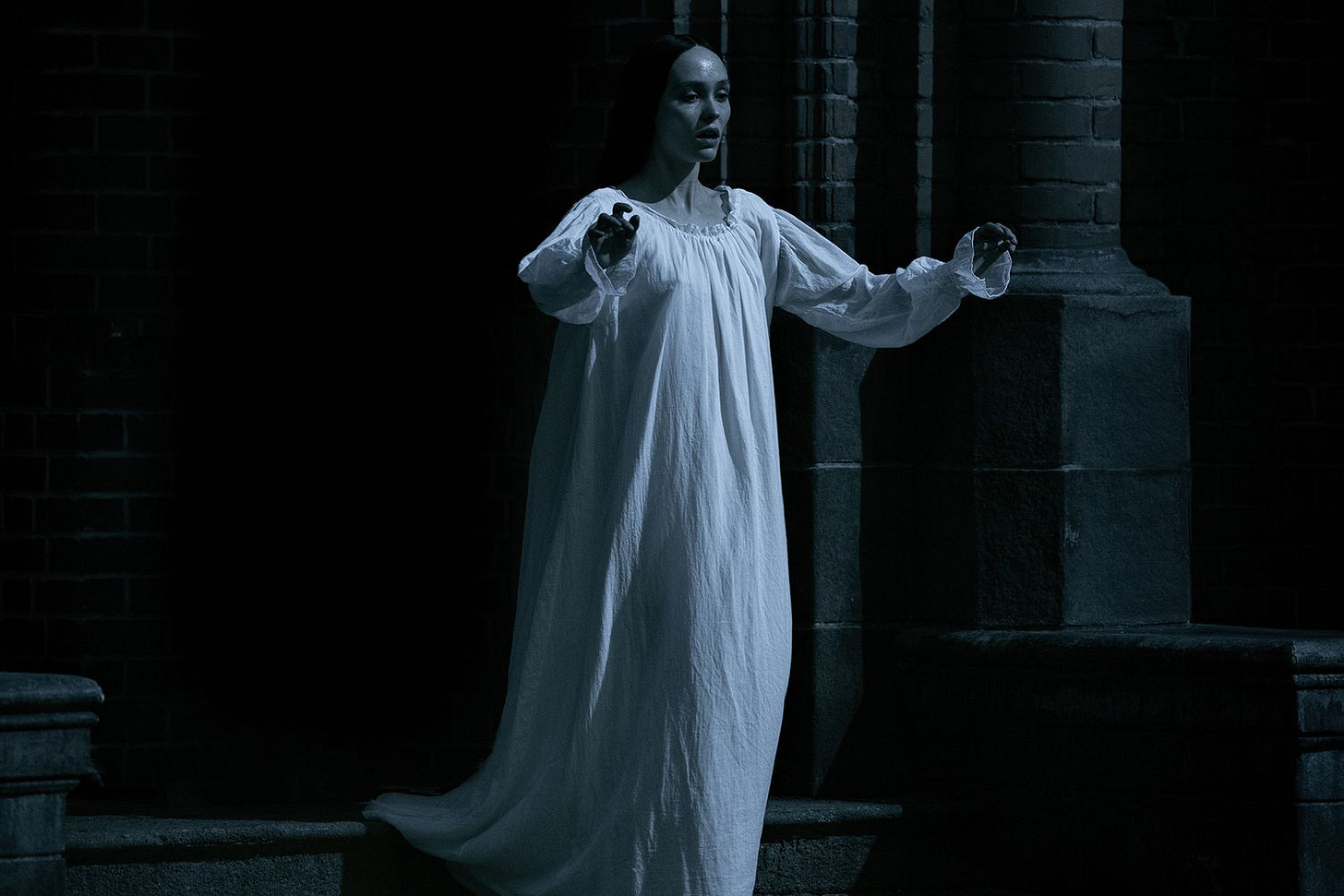Ever lusted after the rotting, diabolical personification of Death?
No, me neither…unless?
Come in, take a seat, have a glass of wine—it’s a little thicker than usual? Just try it, I promise you’ll crave the taste. Oh, that creeping darkness in the corner of the room? Just my 2,000 trained rat actors playing shadow puppets. Don’t worry about it.
Comfortable? Wonderful, let’s begin.
First, I want to confess three things:
If I ever encountered a true vampire, I wouldn’t just wait to be bitten—I’d ask for it. So I might be a bit biased.
I have seen Nosferatu (2024) twice already. I’m writing this as if you have too. Beware.
I’ve invited you here under false pretenses.
Because this essay is not quite about Nosferatu—or at least, not entirely. It’s actually also about Want (2024): a curation of anonymous letters from women and genderqueer people all over the world, collected by Gillian Anderson. These letters detail what most of us never dare to reveal: our innermost sexual fantasies.
Reading Want is an experience in obscenity, shock, and fascination. Not only because it offers insight into the incredibly varied, unique world of women’s unspoken fantasies—but also because of its Goodreads rating.
There are letters in Want about BDSM, alien and Bigfoot sex, and being taken by home intruders. There are letters about living in a society where you can’t safely be yourself, about being married but wanting his brother, about rediscovering sexuality after trauma, widowhood, or disability. There are letters about fucking a tree, fucking your boss, fucking your clone.
Isn’t the near-limitless diversity of the human experience just delightful?
Reviews are in, and they say no.
Want’s reviewers—mostly other women—complain about the book’s lack of analysis on sexuality, or its ostensible inability to impact larger society. They prescribe the letter writers with therapy or divorce. They say it’s “just” smut. They say it’s depressing.
And it is: one of the more memorable letters begins with, “[My fantasy is] to have my husband say he’s hired a cleaner.”
To those reviewers I want to say: Haven’t you ever had one thing—one thing—you indulged in, and locked up inside you, and decided never to tell anyone else?
Haven’t you ever wanted something so badly it terrified you?
Let’s turn now to Ellen, Nosferatu’s heroine, a nervous young woman with killer facial structure. Lonely and grieving, she prays for comfort and love; instead, she invites a malignant presence into her life: a gruff-voiced shadow figure sporting a surprisingly alluring mustache, a rat-infested castle, and hankering for thick, red blood.
First, let’s get one thing straight about the masterpiece that is Nosferatu: our dear protagonist Ellen has done nothing wrong, ever, in her life; and her husband Thomas is useless.
Thomas leaves his wife behind to broker a new estate for the frail, reclusive Count Orlok in distant Transylvania. This is, he hopes, the first of many career successes.
Here’s his list of accomplishments:
Getting his horse stolen.
Stumbling into a vampire’s castle.
Fainting.
Signing away his wife for a bag of gold.
Falling into a river.
And when he finally drags himself back home to save his wife from the undead demon he sold her to?
Ellen confesses that he has always been part of her. Nosferatu is the source of the melancholy and fear that keeps her up at night. He’s even her lover.
Thomas is, understandably, a bit shocked.
And then she turns on him. Ellen blames Thomas for not writing to her while he was in Transylvania. She belittles him by saying he is unsuccessful, a financial failure who can’t provide for her. She emasculates him by calling him weak and foolish, “a swooning lily of a woman.” She taunts him by saying Nosferatu pleases her better than he ever could.
“I stare at myself in the mirror wondering what’s wrong with me and why I can’t be satisfied thinking about my husband while I touch myself. I do love him, horribly and with all of myself…but there’s a small part of me that feels like I’m missing out on the one experience that can make me sexually whole.” - Want, page 20
Ellen preys on what she knows are all of her husband’s weak spots. And even when he takes her, with more passion than we’ve ever seen from him, you wonder: is she enjoying it, or is she imagining Nosferatu between her legs?
Did Ellen mean them, every cruel word she said to Thomas? Does some small part of her wish he were Nosferatu, wish she weren’t resigned to her mundane marriage? Was she just trying to rouse some sign of life from her milquetoast husband, or is she truly possessed by some evil force?
In Ellen’s dreams, she marries Death, and it’s horrific and beatific all at once. Tell me: what kind of life does she even have?
A husband who dismisses her dreams and tells her not to speak them aloud. (Both times I’ve seen the movie, the audience has laughed at Thomas’s reaction here.)
No money or real ambitions of her own, a total dependence on someone else’s success for her quality of life.
A role preordained for her by society, which she can never really escape.
The horror of Nosferatu for Thomas is simple: revulsion and infidelity. A monster who sucks him dry. A weak and sickened body. A wife who secretly pities him and longs after another—I mean, he literally walks in on his wife in bed with another man, albeit a dead one.
“I’m happily married. I think. My husband is a great guy. He’s kind. He’s easy to get on with. We have common interests. He’s a great dad. He respects me. He works hard. He supports me financially. He’s my best friend…But sometimes I wonder how my life would be if he died.” - Want, page 11
Ellen’s horror is different. She’s gripped by terrifying urges she doesn’t understand and can’t control. She’s left behind by her ostensible protector, to be tied up and drugged by the very people who are meant to care for her in her husband’s absence. She’s shamed, yelled at, and abused.
And then there’s Friedrich, the very man who ties her up: the extremely logical to Ellen’s extremely emotional. Though Ellen is his wife Anna’s best friend and his friend Thomas’s wife, Friedrich denies her constantly. He pulls his hands from hers multiple times, as if he can’t stand her touch, as if he senses—and despises—the wrongness within her.
And indeed, Ellen is the antithesis of everything Friedrich values. Dark to his wife Anna’s light, childless to Anna’s pregnancy and motherhood, erratic and hysterical to Anna’s domesticity and submissiveness.
“Why do you hate me?” she asks.
“For your husband’s sake, I pray you will learn to conduct yourself with more deference,” he answers.
I wonder: while Thomas is off being utterly useless in Transylvania, and Friedrich is drugging her senseless, how does Ellen fill her days? Do they leave her tied up in her room, to quietly watch the sunlight creep across the floor until the next hellish night begins?
Does she ever see a bird land outside her window and wish she could fly away?
With a life like that, who wouldn’t want to have the best sex of your life with the decomposing demon that’s been haunting and destroying you for years?
“Even as I’m writing this I feel disgusted with myself. I’m not supposed to have those thoughts and it makes me want to scrub myself clean and crawl into bed with my husband. I’ve kept this fantasy hidden from the world and have never told it to a soul, living or dead. A part of me fears that if anyone finds out I’ll be a social outcast, or possibly thrown into a facility and studied by people like Sigmund Freud.” - Want, page 21
Ultimately, when Nosferatu and Ellen finally meet for the first time on screen, Ellen is the only one strong enough to resist him.
Thomas the husband cannot. Friedrich the rich modern man cannot. But Ellen the hysterical woman can. Nosferatu might threaten her just a teensy bit with the death of everyone she loves, but she does resist him.
At least at first.
“I felt you crawling like a serpent in my body,” she says.
“It is not me. It is your nature…I am an appetite, nothing more.”
I wrote a dissertation about another serpent, once, who personified sex and death—but also knowledge. Who urged another woman to give into her appetites. Who, arguably (depending on who you ask), freed her a bit by doing so.
Nosferatu embodies Ellen’s longing. Indeed, she is the one who woke him.
Nosferatu is a craving that has teeth, that consumes and consumes. A void that destroys Ellen’s life, the lives of her husband and their friends, and the lives of countless others in the city.
A longing echoed in a lonely young girl who wakes a devil, just to have some company.
“I am what you might call a hysterical woman. I curl and uncurl my toes; I stand because I can’t sit; I dream because it feels too uncomfortable to live in that feeling that comes with cancelled plans…No one has ever been able to fuck this feeling out of me.” - Want, page 187
Nosferatu terrifies Ellen, but he also allows her to be her deepest self, the self her husband, Friedrich, and her doctor have all denied.
As Thomas and Friedrich unravel, Ellen becomes more bold. For them, it’s a tragedy—for Ellen, it’s a triumph.
Ultimately, she chooses to sacrifice herself. It’s crucial that it’s her willing choice, her agency, her decision. Despite literally being sold to him because of her own husband’s weakness, Ellen herself must choose to lie with Nosferatu. There is no other way to defeat him, no other way to lift the plague curse, no other way to stop the spread of shadows.
No other way to be herself.
And as dawn breaks, casting sunlight over Nosferatu’s rotten flesh, she looks up at him with a smug smile.
All of the letters in Want are different, but there’s a common thread in most all of them: They have never shared these fantasies with anyone. They feel ashamed. They feel wrong. They feel scared.
And, yes, it’s depressing to read that. It’s depressing to read the stories of so many people who feel trapped. Who feel tied to their beds. Who feel they have no other choice to hide who they are and what they want, under cover of night.
“I’ve embraced this fantasy as my own, my private place; nothing about this fantasy is wrong to have.” - Want, page 128
But isn’t the point that the letter writers finally had a space to write down their fantasies, with no fear of discovery or judgment?
Isn’t the point that they finally got to release years of private thoughts and feelings?
Nosferatu, for Ellen, releases the terror of being her deepest self, of acting on her darkest desires.
That final shot, the blood pouring from Ye Olde Corpse’s rotting orifices while Ellen tenderly cradled his head in ecstasy, made my mouth drop open and my nerves sing.
Life or death. Creation or destruction. Dawn or shadow. Fucking your tormentor or whispering fantasies in an anonymous letter.
To unite the two is to meld two opposites: impossible. Horrific. Erotic in its impossibility and horror.
Fantasies are, after all, only dreams.
Until they aren’t.
“I fantasize about blood exchange with someone I am deeply in love with. Just imagining it is very intense and highly erotic for me. Blood is one of our most potent fluids. I guess there is a reason why vampires are sexy, Gary Oldman as Dracula in particular.” - Want, page 149
Hope you saw Nosferatu, girlie.

